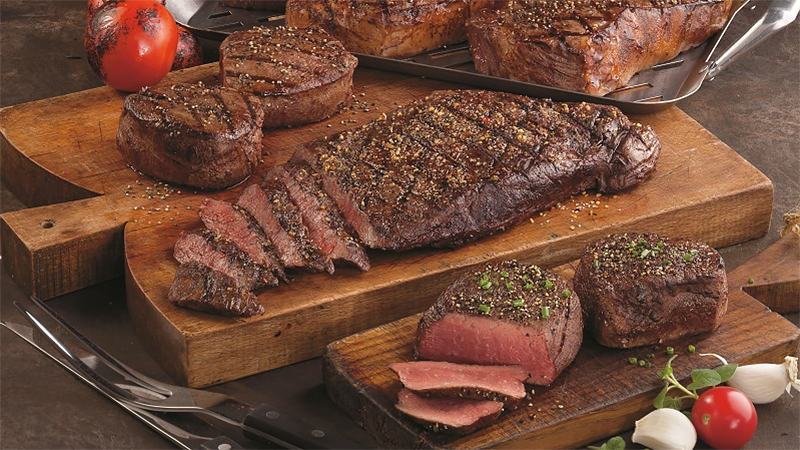A lot was happening in 19th century Japan that affects your next barbecue: the rule of the Shogun ended, Emperor Meiji was restored to power and soon after the famed modern Wagyu cattle was created.
Almost two centuries later, family-owned Snake River Farms offers flavorful, succulent American Wagyu beef with marbling so beautiful it should be in a museum. They also use cutting edge sustainability practices to ensure that our love of delicious, healthier meat doesn’t also wreck the environment.
Long animal husbandry story cut relatively short: Wagyu is Japanese for “Japanese cows,” which is efficiently named. They were hard working draft animals that developed lots of intramuscular fat (more palatably known as marbling) to keep up energy levels. Around the time Emperor Meiji earned back real imperial power, Japan was feeling the influence of the West. That saw crossbreeding between the traditional Wagyu with imported cows like Brown Swiss, Devon, Ayrshire, and Korean cattle. The result was so delicious and highly prized the Japanese declared it a national living treasure and banned it from export. (If you’re confused about the distinction between Kobe beef and Wagyu beef, Kobe is a prefecture in Japan and only cows raised in Kobe are known by that name. Otherwise the beef is known as Kobe-style or Wagyu).
The rest of us lost out on this national living treasure until 1975 when the first Wagyu cattle were exported to the United States to be bred with American breeds of cattle. Somewhat ironically, we mostly exported our version back to Japan until 2003 and it was around then that we Americans took notice.
Wagyu beef isn’t just historically cooler, more tender, and delicious than your average burger, it’s better for you. It’s higher in monounsaturated fat, containing stearic acid, which science people tell us has little impact on raising cholesterol.
So, if you’re ready to live your best life and eat American Wagyu, Snake River Farms is your place. Their commitment to animal welfare, environmental sustainability, and of course, incredible meat, makes them the Wagyu beef of ranchers.

The proprietary herds under Snake River Farms’ care get to spend the first year of their lives grazing naturally in the high pastures of the Pacific Northwest. Even when they come back to the ranch, they roam, graze, play, sleep, do anything happy cows do. Employees are trained in how to ensure the animals aren’t stressed, even in while in transit. They strictly follow both the Beef Quality Assurance and Animal Care and Well Being Standards, often looking for ways to go above and beyond for their animals.
Herds have daily check ups and 24-hour access to a veterinarian. If an animal appears to be sick, it’s taken care of individually, removing the need for keeping whole herds on antibiotics and the herd is never given growth hormones.
Beef production is a major source of pollution, but Snake River Farms focuses on reducing their carbon footprint as much as possible. Most of the grain for cows is sourced from farms within 150 miles, the resulting manure is recycled into fertilizer for local farmers, and their rotational grazing policies help keep the grasslands healthy. Even cooler still, they use the methane via a biogas dome to offset processing plant power needs by 20%. Plus, the beef tallow is used for fuel at their biodiesel plant.
It’s hardly a surprise this care and attention leads to superior beef. In the US we use a grading scale for meat designed by the USDA that is based on marbling. We have three levels: Select, Choice, and Prime. Prime, as its name suggests, is the best: it’s got a high degree of marbling and is usually what you find in fine restaurants. Snake River Farms’ American Wagyu earns Prime almost every time. It’s never below Choice.
But Snake River takes it a step further, also grading their product on the Japanese Beef Marbling Standard, which has 12 levels of marbling grades. A majority of US Prime-graded beef is about a four or a five on the Japanese scale. Snake River offers beef that is either a Black Grade, which is a six or above or the Gold Grade, which is a whopping nine or above, making it top dog of American beef.
Any cut of beef you want, they’ve got, all wet-aged to perfection: Ground beef, Ribeyes, T-bones, Filet Mignon, even the glorious 2”-thick Tomahawk Steak. They also offer Kurobuta pork, which is the pork-equivalent to Wagyu beef. They use only Berkshire hogs, lovingly cared for by small, family farms. Hot dogs, baby back ribs, pork bellies, you name it, they’ve got it.
Their packages are top notch, offering everything you’d need for your barbecue. The Grillers Delight has hot dogs and ground beef, everything you need for an unforgettable barbecue. Or go crazy and choose something like the Steaks and Chops package, which includes two Kurobuta Pork Porterhouses, two Kurobuta boneless pork chops, two 8-oz. Filet Mignons, and two 6-oz. Ribeye Filets. You’d be the fanciest griller in town.
There’s a reason the top restaurants in the world use Snake River Farms’ American Wagyu. There are lots of reasons actually. Their care for animal welfare, their environmentally-friendly production, and their absolutely superior product is destined to make Snake River Farms your new favorite butcher.


